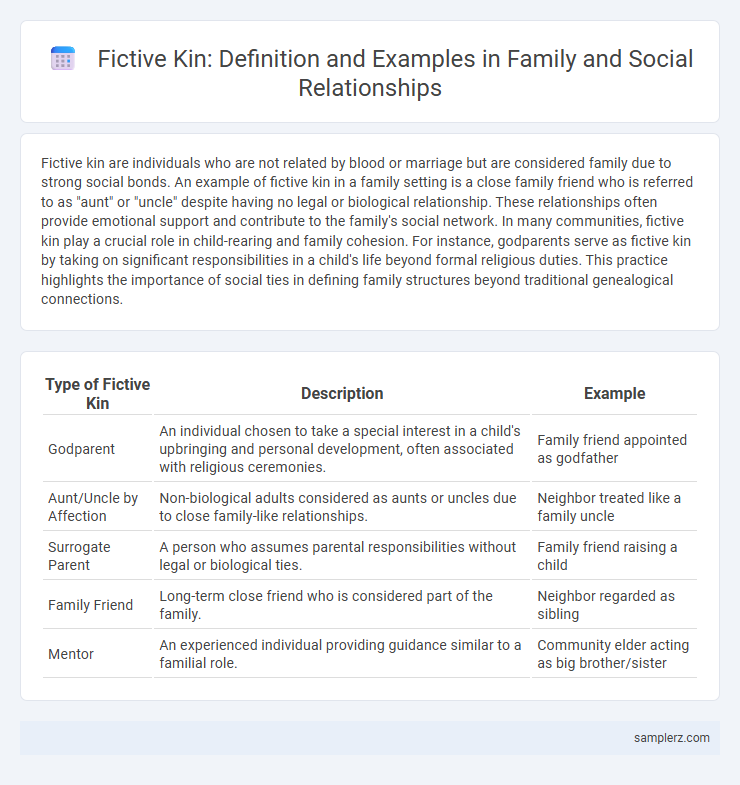Fictive kin are individuals who are not related by blood or marriage but are considered family due to strong social bonds. An example of fictive kin in a family setting is a close family friend who is referred to as "aunt" or "uncle" despite having no legal or biological relationship. These relationships often provide emotional support and contribute to the family's social network. In many communities, fictive kin play a crucial role in child-rearing and family cohesion. For instance, godparents serve as fictive kin by taking on significant responsibilities in a child's life beyond formal religious duties. This practice highlights the importance of social ties in defining family structures beyond traditional genealogical connections.
Table of Comparison
| Type of Fictive Kin | Description | Example |
|---|---|---|
| Godparent | An individual chosen to take a special interest in a child's upbringing and personal development, often associated with religious ceremonies. | Family friend appointed as godfather |
| Aunt/Uncle by Affection | Non-biological adults considered as aunts or uncles due to close family-like relationships. | Neighbor treated like a family uncle |
| Surrogate Parent | A person who assumes parental responsibilities without legal or biological ties. | Family friend raising a child |
| Family Friend | Long-term close friend who is considered part of the family. | Neighbor regarded as sibling |
| Mentor | An experienced individual providing guidance similar to a familial role. | Community elder acting as big brother/sister |
Understanding Fictive Kin: Redefining Family Bonds
Fictive kin refers to individuals who are not biologically or legally related but hold significant familial roles, such as close friends or mentors considered as family. These relationships provide emotional support, caregiving, and a sense of belonging that parallels traditional kinship. Recognizing fictive kin challenges conventional definitions of family, emphasizing social bonds and mutual responsibility over genetic ties.
Common Roles of Fictive Kin in Social Networks
Fictive kin often take on roles such as surrogate parents, mentors, and emotional supporters within social networks, filling gaps where biological family ties may be absent or limited. They provide essential resources like child care, financial assistance, and guidance, reinforcing social cohesion and resilience in communities. These roles enhance social capital by extending trust and reciprocal obligations beyond traditional kinship boundaries.
Historical Perspectives on Fictive Kin in Different Cultures
Historical perspectives reveal fictive kinship as a vital social structure in diverse cultures, such as the "compadrazgo" system in Latin America where godparents hold parental roles beyond biological ties. In African societies, fictive kin relationships often extend clan membership and facilitate social cohesion, especially among enslaved peoples. These examples highlight fictive kinship's role in strengthening family networks and providing social support across generations and cultural boundaries.
Godparents as Fictive Kin: Beyond Blood Relations
Godparents serve as a prominent example of fictive kin, establishing familial bonds through social and emotional commitments rather than biological ties. They often assume caregiving roles and responsibilities similar to those of biological parents, providing guidance, support, and a sense of belonging to godchildren. This relationship exemplifies how kinship networks extend beyond genetics, reinforcing community and social cohesion.
Fictive Aunts and Uncles: Chosen Family Ties
Fictive aunts and uncles represent chosen family ties where individuals establish deep, supportive relationships beyond biological connections, enriching family networks with love and guidance. These bonds often provide emotional support, mentorship, and a sense of belonging, especially in communities valuing kinship beyond genetics. Research highlights that fictive kinship, including aunts and uncles, strengthens social resilience and cultural identity across diverse social environments.
The Importance of Mentors and Family Friends as Fictive Kin
Mentors and family friends often serve as vital fictive kin by providing emotional support, guidance, and nurturing role models outside of biological relationships. Their presence strengthens social bonds and fosters resilience, especially in families facing challenges or limited resources. These connections enhance social capital, offering valuable opportunities for personal growth and community integration.
Fictive Siblings: Creating Brotherhood and Sisterhood
Fictive siblings form strong familial bonds without biological ties, often arising through shared experiences, emotional support, or mutual care within social environments such as foster care, adoption, or close friendship circles. These relationships foster a sense of brotherhood and sisterhood, promoting emotional resilience and social connectedness similar to traditional siblings. Examples include childhood friends who regard each other as siblings or foster children who share sibling-like bonds despite differing biological backgrounds.
Fictive Kinship in LGBTQ+ Communities
Fictive kinship in LGBTQ+ communities often manifests through chosen families, where individuals form strong, family-like bonds with friends to provide emotional support and mutual care outside of biological ties. These chosen families can include mentors, roommates, and close friends who fulfill roles traditionally occupied by blood relatives, helping to navigate social challenges and discrimination. By creating these networks, LGBTQ+ individuals build resilient social structures that enhance well-being and foster a sense of belonging.
Fictive Kin During Times of Crisis: Community Support Systems
Fictive kin relationships often emerge as vital support systems during times of crisis, providing emotional and practical assistance when biological family members are unavailable or insufficient. These bonds, such as close family friends or neighbors who take on caregiving roles, enhance community resilience and mental health by fostering trust and mutual aid. Studies indicate that individuals with strong fictive kin networks experience lower stress levels and improved coping mechanisms in disasters and personal hardships.
The Impact of Fictive Kin on Family Dynamics and Well-being
Fictive kin, such as close family friends or godparents, play a vital role in enhancing emotional support and cohesion within families. Their presence often mitigates stress by providing additional caregiving resources and fostering resilience during crises. Research indicates that families incorporating fictive kin exhibit improved mental health outcomes and stronger intergenerational bonds.

example of fictive kin in family Infographic
 samplerz.com
samplerz.com